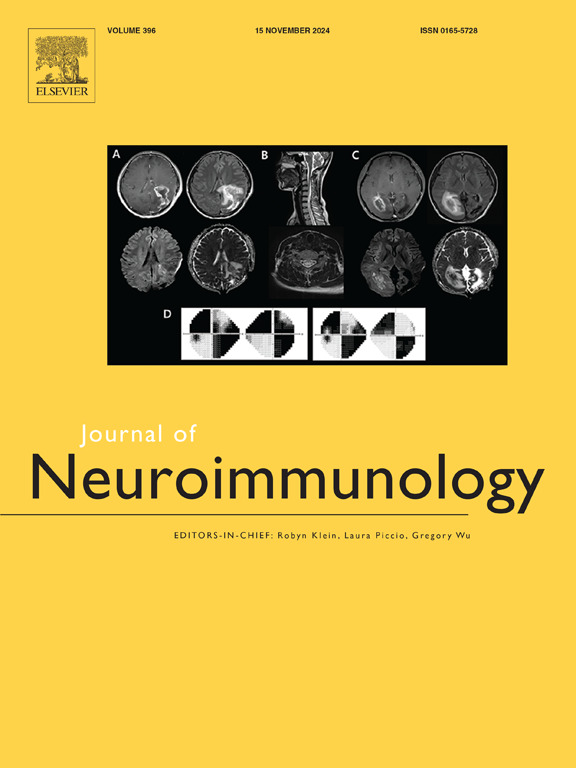苯甲酰乙腈作为一种新型抗炎化合物在实验性自身免疫性脑脊髓炎中减弱小胶质细胞和脑源性T细胞的激活
IF 2.5
4区 医学
Q3 IMMUNOLOGY
引用次数: 0
摘要
多发性硬化症(MS)是一种自身免疫性疾病,以免疫介导的神经炎症和脱髓鞘为特征,由CNS驻留免疫细胞、小胶质细胞(MG)和CNS浸润致病性T细胞引发。实验性自身免疫性脑脊髓炎(Experimental autoimmune encephalomyelitis, EAE)是MS的动物模型,MG活化和致病性Th1/Th17细胞浸润是EAE发生发展的重要机制。我们之前证明了苯甲酰乙腈发挥神经免疫调节活性,并鉴定了化合物7a(以下简称BTA)作为有前途的类似物。在这里,我们研究了BTA是否具有调节EAE炎症反应的作用,并评估了其对EAE MG激活、致病性Th1/Th17分化和中枢神经系统浸润的影响。我们的结果显示BTA改善了慢性C57BL/6 EAE模型的疾病严重程度。进一步研究表明,BTA抑制MG激活,减弱CNS Th1/Th17浸润,抑制EAE外周Th1/Th17分化。通过蛋白质阵列,我们证实BTA通过抑制炎症细胞因子/趋化因子的产生来抑制MG的激活。此外,BTA在体外抑制Th1/Th17极化,表明BTA对Th1/Th17分化有直接抑制作用。最后,我们的研究结果表明,BTA在复发缓解型SJL EAE模型中可以预防疾病复发。综上所述,我们的研究表明BTA在慢性EAE中具有保护作用,在复发缓解型EAE中具有治疗作用,分别可以改善病情严重程度和减轻复发。进一步的体内和体外研究表明,BTA具有抑制MG激活和Th1/Th17分化的作用。综上所述,我们的研究结果表明,苯甲酰乙腈支架可以作为一种新的治疗MS/EAE的药物。本文章由计算机程序翻译,如有差异,请以英文原文为准。
Benzoylacetonitrile as a novel anti-inflammatory compound on attenuating microglia and encephalitogenic T cell activation in experimental autoimmune encephalomyelitis
Multiple sclerosis (MS) is an autoimmune disorder and characterized by immune-mediated neuroinflammation and demyelination triggered by the CNS resident immune cells, microglia (MG), and CNS infiltrating pathogenic T cells. Experimental autoimmune encephalomyelitis (EAE) is an animal model of MS, and MG activation and pathogenic Th1/Th17 cell infiltration is responsible for EAE development and progression. We previously demonstrated that benzoylacetonitriles exerted neuro-immunomodulatory activity and identified compound 7a (referred to henceforth as BTA) as promising analog. Here, we investigated whether BTA possessed effects on modulating inflammatory responses in EAE and assessed its effects on MG activation and pathogenic Th1/Th17 differentiation and CNS infiltration in EAE. Our results showed BTA ameliorated disease severity in the chronic C57BL/6 EAE model. Further studies demonstrated BTA suppressed MG activation, attenuated CNS Th1/Th17 infiltration, and inhibited peripheral Th1/Th17 differentiation in EAE. Using protein array, we confirmed BTA inhibited MG activation by suppressing inflammatory cytokines/chemokine production. Furthermore, BTA suppressed Th1/Th17 polarization in vitro, indicating a direct suppressive effect of BTA on Th1/Th17 differentiation. Finally, our results showed that BTA prevented disease relapse in the relapsing-remitting SJL EAE model. In conclusion, our study demonstrates BTA possessed protective and therapeutic effects by ameliorating disease severity in the chronic EAE and mitigating relapse in the relapsing-remitting EAE, respectively. Further analysis revealed BTA exerted effects on inhibiting MG activation and Th1/Th17 differentiation, demonstrated by in vivo and in vitro studies. Altogether, our results suggest the benzoylacetonitrile scaffold could be developed as a novel therapeutic agent for MS/EAE treatment.
求助全文
通过发布文献求助,成功后即可免费获取论文全文。
去求助
来源期刊

Journal of neuroimmunology
医学-免疫学
CiteScore
6.10
自引率
3.00%
发文量
154
审稿时长
37 days
期刊介绍:
The Journal of Neuroimmunology affords a forum for the publication of works applying immunologic methodology to the furtherance of the neurological sciences. Studies on all branches of the neurosciences, particularly fundamental and applied neurobiology, neurology, neuropathology, neurochemistry, neurovirology, neuroendocrinology, neuromuscular research, neuropharmacology and psychology, which involve either immunologic methodology (e.g. immunocytochemistry) or fundamental immunology (e.g. antibody and lymphocyte assays), are considered for publication.
 求助内容:
求助内容: 应助结果提醒方式:
应助结果提醒方式:


